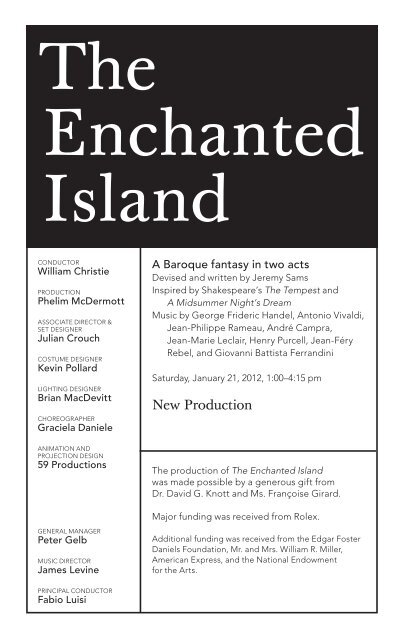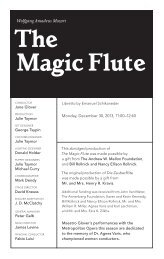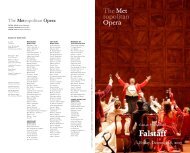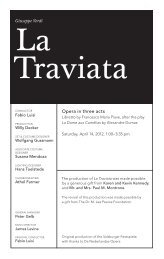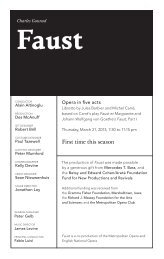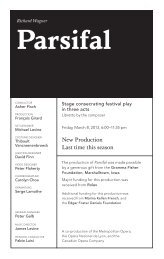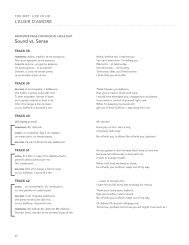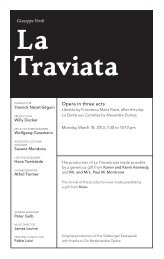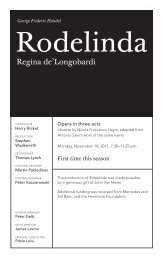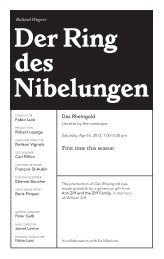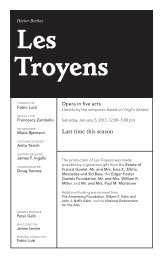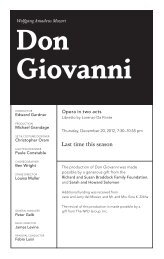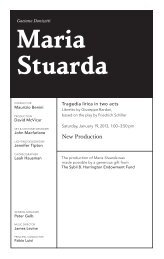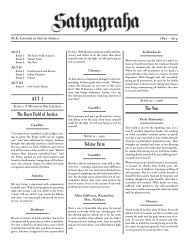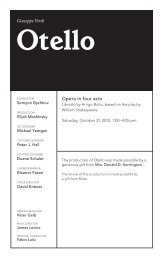The Enchanted Island - Metropolitan Opera
The Enchanted Island - Metropolitan Opera
The Enchanted Island - Metropolitan Opera
Create successful ePaper yourself
Turn your PDF publications into a flip-book with our unique Google optimized e-Paper software.
<strong>The</strong><br />
<strong>Enchanted</strong><br />
<strong>Island</strong><br />
CONDUCTOR<br />
William Christie<br />
PRODUCTION<br />
Phelim McDermott<br />
ASSOCIATE DIRECTOR &<br />
SET DESIGNER<br />
Julian Crouch<br />
COSTUME DESIGNER<br />
Kevin Pollard<br />
LIGHTING DESIGNER<br />
Brian MacDevitt<br />
CHOREOGRAPHER<br />
Graciela Daniele<br />
ANIMATION AND<br />
PROJECTION DESIGN<br />
59 Productions<br />
GENERAL MANAGER<br />
Peter Gelb<br />
MUSIC DIRECTOR<br />
James Levine<br />
PRINCIPAL CONDUCTOR<br />
Fabio Luisi<br />
A Baroque fantasy in two acts<br />
Devised and written by Jeremy Sams<br />
Inspired by Shakespeare’s <strong>The</strong> Tempest and<br />
A Midsummer Night’s Dream<br />
Music by George Frideric Handel, Antonio Vivaldi,<br />
Jean-Philippe Rameau, André Campra,<br />
Jean-Marie Leclair, Henry Purcell, Jean-Féry<br />
Rebel, and Giovanni Battista Ferrandini<br />
Saturday, January 21, 2012, 1:00–4:15 pm<br />
New Production<br />
<strong>The</strong> production of <strong>The</strong> <strong>Enchanted</strong> <strong>Island</strong><br />
was made possible by a generous gift from<br />
Dr. David G. Knott and Ms. Françoise Girard.<br />
Major funding was received from Rolex.<br />
Additional funding was received from the Edgar Foster<br />
Daniels Foundation, Mr. and Mrs. William R. Miller,<br />
American Express, and the National Endowment<br />
for the Arts.
This performance<br />
is being<br />
broadcast<br />
live over <strong>The</strong><br />
Toll Brothers–<br />
<strong>Metropolitan</strong><br />
<strong>Opera</strong><br />
International<br />
Radio Network,<br />
sponsored by<br />
Toll Brothers,<br />
America’s luxury<br />
homebuilder ® ,<br />
with generous<br />
long-term<br />
support from<br />
<strong>The</strong> Annenberg<br />
Foundation, the<br />
Vincent A. Stabile<br />
Endowment for<br />
Broadcast Media,<br />
and contributions<br />
from listeners<br />
worldwide.<br />
This<br />
performance<br />
is also being<br />
broadcast live<br />
on <strong>Metropolitan</strong><br />
<strong>Opera</strong> Radio<br />
on SiriusXM<br />
channel 74.<br />
2011–2012 Season<br />
<strong>The</strong> 7th <strong>Metropolitan</strong> <strong>Opera</strong> performance of<br />
<strong>The</strong><br />
<strong>Enchanted</strong><br />
<strong>Island</strong><br />
Conductor<br />
William Christie<br />
IN ORDER OF VOCAL APPEARANCE<br />
Prospero<br />
David Daniels<br />
Ariel<br />
Danielle de Niese **<br />
Sycorax<br />
Joyce DiDonato<br />
Caliban<br />
Luca Pisaroni<br />
Miranda<br />
Lisette Oropesa **<br />
Helena<br />
Layla Claire *<br />
Hermia<br />
Elizabeth DeShong<br />
Demetrius<br />
Paul Appleby *<br />
Lysander<br />
Elliot Madore *<br />
Neptune<br />
Plácido Domingo<br />
Saturday, January 21, 2012, 1:00–4:15 pm<br />
Quartet<br />
Ashley Emerson **<br />
Monica Yunus<br />
Philippe Castagner **<br />
Tyler Simpson<br />
Ferdinand<br />
Anthony Roth Costanzo<br />
CONTINUO<br />
Bradley Brookshire, harpsichord<br />
David Heiss, cello
Yamaha is the official piano<br />
of the <strong>Metropolitan</strong> <strong>Opera</strong>.<br />
Latecomers will not be<br />
admitted during the<br />
performance.<br />
* Member of the<br />
Lindemann Young Artist<br />
Development Program<br />
** Graduate of the<br />
Lindemann Young Artist<br />
Development Program<br />
Visit metopera.org<br />
This afternoon’s performance is being transmitted<br />
live in high definition to movie theaters worldwide.<br />
<strong>The</strong> Met: Live in HD series is made possible by a generous grant<br />
from its founding sponsor, the Neubauer Family Foundation.<br />
Bloomberg is the global corporate sponsor of <strong>The</strong> Met: Live in HD.<br />
Chorus Master Donald Palumbo<br />
Musical Advisor Ellen Rosand<br />
Dramaturg Paul Cremo<br />
Musical Preparation Steven Eldredge, Dan Saunders,<br />
Carol Isaac, Steven White, and Bradley Brookshire<br />
Assistant Stage Directors Peter McClintock,<br />
Sarah Ina Meyers, and Kathleen Smith Belcher<br />
Met Titles Michael Panayos<br />
Prompter Carol Isaac<br />
English Coach Erie Mills<br />
Assistant to the Set Designer Rob Thirtle<br />
Assistant to the Costume Designer Amanda Stoodley<br />
Scenery, properties, and electrical props constructed and<br />
painted in <strong>Metropolitan</strong> <strong>Opera</strong> Shops<br />
Costumes executed by <strong>Metropolitan</strong> <strong>Opera</strong> Costume<br />
Department<br />
Wigs by <strong>Metropolitan</strong> <strong>Opera</strong> Wig Department<br />
Masks by Julian Crouch<br />
animation and projection<br />
Designers Mark Grimmer, Lysander Ashton, Leo Warner<br />
(59 Productions); Animators Zsolt Balogh, MIE Ltd.,<br />
Sergei Shabarov, Peter Stenhouse, Lawrence Watson;<br />
Programmer Benjamin Pearcy<br />
<strong>The</strong> <strong>Metropolitan</strong> <strong>Opera</strong> and 59 Productions extend their<br />
sympathies to the family of Peter Stenhouse, 59 Productions’<br />
Director of Animation, who created the memorable Chagall<br />
animation for the Met’s 125th Anniversary Gala and was<br />
working on material for <strong>The</strong> <strong>Enchanted</strong> <strong>Island</strong> when he died<br />
in August, aged 30.<br />
This performance is made possible in part by public funds from the<br />
New York State Council on the Arts.<br />
Before the performance begins, please switch off cell phones and<br />
other electronic devices.<br />
This production uses flash and lightning effects.<br />
Met Titles<br />
To activate, press the red button to the right of the screen in front of your<br />
seat and follow the instructions provided. To turn off the display, press<br />
the red button once again. If you have questions please ask an usher at<br />
intermission.
30<br />
Synopsis<br />
Act I<br />
Prospero, the exiled Duke of Milan, lives on a remote island with his daughter,<br />
Miranda, surrounded by his books, potions, and instruments of magic. Prospero had<br />
at first taken up with the sorceress Sycorax, who ruled the island. But having loved<br />
her, he left her, banishing her to the dark side of the island, stealing her sprite servant,<br />
Ariel, and enslaving her son, Caliban.<br />
Our story begins some 16 years later. In his cell, an aging Prospero conceives a final<br />
plan to ensure Miranda’s future happiness and end his exile. He divines that a ship<br />
is passing nearby bearing the King of Naples and Prince Ferdinand, whom Prospero<br />
has destined for Miranda. Prospero commands Ariel to perform a spell that will<br />
cause a storm and shipwreck the royals on the island. In return, he promises Ariel<br />
his freedom.<br />
Caliban, who has overheard their conversation, rushes to Sycorax’s cave to tell his<br />
mother. Sensing that Prospero is vulnerable, Sycorax tells Caliban to steal a vial of<br />
dragon’s blood from Prospero’s cell, which she will use to restore her enfeebled<br />
powers so she and Caliban can regain control of the island.<br />
Near his cell, Prospero finds Miranda troubled by dreams and unfamiliar emotions.<br />
Meanwhile, Caliban steals the vial, vowing that he will rule the island with<br />
Miranda as his queen. He substitutes another vial of worthless lizard’s blood. Ariel<br />
mistakenly uses this for the Tempest Spell, with catastrophic consequences: Two<br />
pairs of honeymooning lovers—Helena and Demetrius, Hermia and Lysander—are<br />
shipwrecked when their vessel flounders and separately cast ashore on the island.<br />
Prospero commands Ariel to find Prince Ferdinand and cast a spell on him to ensure<br />
that Ferdinand and Miranda will fall in love immediately. But the first man Ariel sees<br />
is Demetrius, not Ferdinand. Ariel dutifully casts the spell on him and leads him to<br />
Miranda. <strong>The</strong> two fall in love, much to Prospero’s fury.<br />
Lysander has come ashore on a golden strand near Prospero’s cell. He is cursing<br />
Neptune for, he thinks, washing his beloved Hermia out to sea. Ariel wrongly assumes<br />
that he has finally found Ferdinand and casts the spell to make Miranda and Lysander<br />
fall in love—much to Demetrius’s fury.<br />
An exhausted Helena arrives in a forest on the other side of the island. She is<br />
observed by Sycorax, who decides to give Helena to Caliban as his queen instead<br />
of Miranda, the daughter of her enemy. Using the stolen dragon’s blood, Sycorax<br />
conjures a spell to make Helena fall in love with Caliban—much to his delight—and<br />
hopes the spell is strong enough to last.<br />
Ariel, having cast a spell on the wrong man twice, realizes that the true Ferdinand<br />
must still be somewhere out at sea. He decides to go to the very top, and calls upon<br />
Neptune for help. <strong>The</strong> sea god appears, furious that a human, Lysander, has been
cursing him and angry that Ariel has disturbed the peace in his realm. Ariel begs<br />
Neptune to find Ferdinand, and Neptune finally agrees to scour the seas.<br />
Outside his cell, Prospero contemplates the chaos he has wrought—lovers<br />
mismatched, Ariel frantic, Caliban running wild, and Ferdinand nowhere in sight. He<br />
despairs of ever achieving his dream.<br />
Intermission (at APPROXIMATELY 2:35 PM)<br />
Act II<br />
On the shore, Hermia awakens from a nightmare, only to realize that her dream was<br />
all too true: Her new husband Lysander was swept away from her in the storm. She<br />
runs off to find him and discovers him at Prospero’s cell doting on Miranda—with no<br />
memory of his wife.<br />
In her cave, Sycorax exults in her revived powers and the certainty that she will soon<br />
have her revenge on Prospero and regain control of the island for her son.<br />
Hermia is reunited with Helena. Helena’s memory and emotions have been stirred<br />
by the sight of Demetrius, despite the fact that he is with Miranda and fails to<br />
recognize her. Hermia and Helena bemoan the fickleness of men. Helena then takes<br />
off after Demetrius, spurning Caliban, who is crushed. Caliban rushes to Sycorax for<br />
consolation, but she explains that hearts that love can always be broken.<br />
Caliban, in his fury, steals a magic book from Prospero’s cell and conjures a dream of<br />
himself as a potentate of the world, attended by loving subjects. When his fantasy<br />
spins out of control and the creatures turn on him, Prospero intervenes and disperses<br />
them.<br />
Neptune finds Ferdinand’s ship and sends it racing toward the island. Ferdinand<br />
looks toward his future. Like Miranda, he has been dreaming of an elusive someone.<br />
Ariel sets about putting matters to rights, leading the five mismatched lovers<br />
through a forest maze until they fall asleep side by side. Ariel ensures through his<br />
magic that, when they awaken, the lovers are paired with their proper and previous<br />
mates. All make their way to the shore to see Ferdinand and the king arrive, greeted<br />
by Prospero. Ferdinand reads the pardon ending Prospero’s exile. When he sees<br />
Miranda, he falls in love instantly, deeply and forever—no spell required.<br />
Sycorax enters with Caliban and challenges Prospero. When he rebuffs her, Neptune<br />
appears and takes her part, berating Prospero for victimizing others as he himself<br />
was once victimized. Ashamed, Prospero begs forgiveness of Sycorax and gives the<br />
island back to her and her son. Neptune extols the virtues of mercy and Sycorax<br />
grants Prospero forgiveness. All join to celebrate a new day of joy, peace, and love.<br />
Visit metopera.org<br />
31
32<br />
In Focus: <strong>The</strong> <strong>Enchanted</strong> <strong>Island</strong><br />
World Premiere: New York, <strong>Metropolitan</strong> <strong>Opera</strong>, 2011<br />
Inspired by the 18th-century tradition of the pastiche, <strong>The</strong> <strong>Enchanted</strong> <strong>Island</strong> is a new<br />
work featuring music by some of the Baroque era’s greatest composers and a new<br />
libretto devised and written by Jeremy Sams. A popular genre in its day, a pastiche<br />
(or pasticcio) combines existing music by one or several composers with a new text<br />
and storyline. Handel, Vivaldi, and Rameau all devised pastiches from their own<br />
music. <strong>The</strong> dramatic framework of <strong>The</strong> <strong>Enchanted</strong> <strong>Island</strong> brings together situations<br />
and characters from two Shakespearean plays: during their honeymoon voyage, the<br />
four lovers from A Midsummer Night’s Dream are shipwrecked on Prospero’s island<br />
from <strong>The</strong> Tempest. In addition to the characters found in the original plays, <strong>The</strong><br />
<strong>Enchanted</strong> <strong>Island</strong> imagines the sorceress Sycorax (who is mentioned in <strong>The</strong> Tempest<br />
but never appears on stage) and Prospero vying for control of the island. <strong>The</strong> musical<br />
selections are drawn from the works of a wide range of composers, including some<br />
who are lesser known today, such as André Campra, Jean-Marie Leclair, and Jean-<br />
Féry Rebel. <strong>The</strong> great operas of the early 18th century are remarkably well suited<br />
to this process of rearrangement, since their solos were usually tailored to the skills<br />
of specific performers, and replacements of individual numbers were a common<br />
feature of revivals at the time. (In fact, the stars of the Met production had some<br />
input on the selection of their respective arias.) <strong>The</strong> <strong>Enchanted</strong> <strong>Island</strong> celebrates this<br />
music and pays homage to the tradition of its creation, while also showcasing the<br />
talents of some of today’s most accomplished interpreters of the Baroque repertoire.<br />
<strong>The</strong> Creators<br />
<strong>The</strong> German-born George Frideric Handel (1685–1759) spent most of his career in<br />
London. While his choral and orchestral works have remained popular up to the<br />
present day, his more than 40 operas disappeared from the stage for almost two<br />
centuries. <strong>The</strong> modern Handel opera revival began in the 1920s and has brought<br />
many works back to the repertoire in recent decades. <strong>The</strong> equally prolific Italian<br />
Antonio Vivaldi (1678–1741) likewise is best remembered today for his orchestral<br />
pieces, in particular the violin concertos known as “<strong>The</strong> Four Seasons.” Most<br />
of his operas (he claimed to have written close to a hundred, of which some two<br />
dozen survive) still await rediscovery. Jean-Philippe Rameau (1683–1764), France’s<br />
leading composer in his time, wrote operas in several styles. Although influential,<br />
his œuvre fell into obscurity until interest in early music was revived in the 20th<br />
century. Henry Purcell (1658/59–1695), one of England’s greatest composers, was a<br />
creator of sacred and secular music in a variety of forms. Among his most famous<br />
works is the opera Dido and Aeneas. He contributed music to an adaptation of <strong>The</strong><br />
Tempest in 1694. Other musical numbers in <strong>The</strong> <strong>Enchanted</strong> <strong>Island</strong> are taken from the<br />
works of the Venetian Giovanni Battista Ferrandini (c. 1710–1791) and three French<br />
composers: André Campra (1660–1744), Jean-Féry Rebel (1666–1747), and Jean-<br />
Marie Leclair (1697–1764). <strong>The</strong> plays of William Shakespeare (1564–1616), among the<br />
most highly regarded works in the English language, have provided rich material<br />
for opera composers for centuries. Jeremy Sams, who devised the new libretto for<br />
<strong>The</strong> <strong>Enchanted</strong> <strong>Island</strong>, is a British writer, translator, director, and composer who has<br />
worked with London’s Royal <strong>Opera</strong> House, the English National <strong>Opera</strong>, and the<br />
Royal National <strong>The</strong>atre, as well as on Broadway and in the West End.<br />
Visit metopera.org
Program Note<br />
by Jeremy Sams<br />
Looking back over this one it’s hard to recall which came first—the words, the<br />
music, the story, the cast…? All those factors influenced each of the others at<br />
some time or other. <strong>The</strong> one thing certain is that the original idea came from<br />
Peter Gelb. “Imagine,” he said, “taking the hidden gems from a century of music, and<br />
turning them into one opera. Oh, and it has to be in English.” That was the genesis,<br />
and like the best of them it culminated (for me at least) in revelations. I embarked<br />
on a very eclectic listening regime. I knew my Handel—at least I thought I did—but<br />
I now started listening to everything in growing amazement. I was reminded of what<br />
George Bernard Shaw wrote about a revelatory Beethoven performance: “I did with<br />
my ears what I do with my eyes when they stare.” <strong>The</strong> operas, more than 40 of them,<br />
are stuffed with wonders. <strong>The</strong> oratorios are every bit as dramatic. Most revelatory to<br />
me was the Handel of the early Italian cantatas and of youthful masterpieces like <strong>The</strong><br />
Triumph of Time and <strong>The</strong> Resurrection, where we see an already fully-formed genius<br />
spreading his wings. Handel is above all a theater man to his fingertips. Even the<br />
Coronation Anthems (I allowed myself a ridiculously famous one—but Domingo’s<br />
entrance seemed to demand it) are every bit as theatrical as his magical operas.<br />
After Handel came Vivaldi, who, thanks to some remarkable recent recordings,<br />
is now very much on the operatic map. If he perhaps can’t match Handel’s range<br />
(who can?), he has an aching lyricism and above all a kinetic energy, a virile oomph<br />
unrivaled by any of his contemporaries. He weighs in with nine arias in <strong>The</strong> <strong>Enchanted</strong><br />
<strong>Island</strong>. I could have included 20 more.<br />
<strong>The</strong> other main strand of my listening was the French Baroque. Here again we<br />
find a host of theater folk. Not just Lully and Charpentier (neither of whom made<br />
the cut), but above all Rameau. Rameau is simply astonishing. Rarely does old music<br />
sound so modern. As eccentric as Berlioz, he came to opera even later in his life than<br />
Janáček and wrote the best ballet music before Tchaikovsky, some may say before<br />
Stravinsky. My Act II “dream ballet” (<strong>Enchanted</strong> <strong>Island</strong> is indebted here, as often<br />
elsewhere, to Broadway precedent) is mostly Rameau. Rameau’s operas themselves<br />
are direct descendants of a weird and wonderful school of French cantatas (notably<br />
by Leclair) in which sorceresses and incantations abound, and it was becoming<br />
increasingly clear that my story was going to need both.<br />
So, to the story. My thinking was, simply put, that a new take on old music needs<br />
a new take on an old story. It’s hard (at least for me) to think of stories without thinking<br />
of Shakespeare—and it was listening to Purcell that first brought <strong>The</strong> Tempest to<br />
mind. Dryden’s version, with music by Purcell, was indeed called <strong>The</strong> <strong>Enchanted</strong><br />
<strong>Island</strong>, a title too good to miss. Dryden, though, had spotted that a desert island is<br />
going, by definition, to be slightly devoid of love interest, and love is what fuels the<br />
aria-making machine that is Baroque opera. Someone falls in love… Aria. Someone<br />
looks on… Jealousy Aria. Someone is deceived… Aria of Rage. Love drives the<br />
bus. Dryden’s addition of a boy-mad sister to Miranda wasn’t too inspiring. But his<br />
fleshing out of the sorceress Sycorax—Caliban’s mother and Ariel’s former mistress—<br />
was too good not to steal. It wasn’t too much of a stretch to imagine her seduced,<br />
spurned, and then banished by Prospero to the dark side of the island. He steals<br />
her land, her son, her servant, her heart—all useful motives for revenge, and for<br />
the Revenge Aria (we have a cracker in Act I), not to mention reconciliation and the<br />
33
34<br />
Program Note CONTINUED<br />
Forgiveness Aria (ditto in Act II). Still, the lack of a love interest remained. <strong>The</strong> aria<br />
machine was demanding more fuel. My back-up choice of Shakespeare play was<br />
always A Midsummer Night’s Dream, mostly for its four intertwining lovers, with their<br />
four voice types (they reappear, you’ll notice, in Così fan tutte, in <strong>The</strong> Gondoliers,<br />
even, mutatis mutandis, in Sondheim’s Follies). I was getting character envy. So I<br />
thought, let’s mix them up and see where the story takes us. Lysander and Demetrius<br />
are maybe accompanying their wives on a post-play honeymoon cruise, when they<br />
get caught up in Ariel’s tempest. Why did he zap the wrong ship? Because Sycorax<br />
corrupted the spell. Maybe she then tries to ensure the future of her island by helping<br />
Helena to fall for Caliban. Miranda, aided by the increasingly incompetent Ariel<br />
(most Puck-like in his haplessness) can fall in love, with equal fervor, with Demetrius<br />
and Lysander. Lest things get too complicated, I could hide Hermia in a cave until<br />
Act II. It was sort of writing itself.<br />
Which brings me to casting. As soon as I thought of <strong>The</strong> Tempest I was hearing<br />
voices. Prospero—numinous, shamanic—could only be a countertenor. Spritely Ariel,<br />
a coloratura soprano. Caliban, a bass. Sycorax, a dramatic mezzo. Miranda, a lyric<br />
soprano. At the same time, the Met was planning the season, and their wish list<br />
was remarkably congruent with my needs. David Daniels, Danielle de Niese, Luca<br />
Pisaroni, Joyce DiDonato, and Lisette Oropesa were free and interested, and I was<br />
starting to feel like a greedy kid in a candy store.<br />
<strong>The</strong>n came Plácido Domingo. Peter invited him to join the production and asked<br />
if I could create a role for him. Could I? Thus the role of Neptune was born. And very<br />
handy he proved for plot purposes. A god (Domingo has, amazingly, never played<br />
one) can always galvanize events, and put wrongs to right. I always wanted the<br />
characters to go on a journey, and Neptune is no exception. He starts depressed and<br />
irritable—his powers are waning, his oceans polluted—but he rediscovers his mojo,<br />
as it were, and intervenes in the affairs of men. His is the climax of Act I, an astonishing<br />
Handel scena (from Tamerlano) that segues into some epic helden-Rameau.<br />
By now music and story were informing each other. A ravishing sleep aria from<br />
Vivaldi’s Tito Manlio demanded to be included, so I wrote a sleep scene to justify it.<br />
Similarly, the artists, now cast, had music they very much wanted to sing. (Interestingly,<br />
Vivaldi was high on everyone’s list of preferences.) I was only too happy to bend the<br />
story to lead to the preferred arias. By this stage, also, missing jigsaw pieces, all<br />
dictated by the story, were being identified. I would contact our maestro, William<br />
Christie, and Yale’s Ellen Rosand (fount of knowledge on all things Baroque) and<br />
ask questions like, “Is there a fast trio for baritone, tenor, and soprano, in which the<br />
woman is impervious to male wooing?” (Yes, in Handel’s Susanna.) “Is there a mixed<br />
quartet that might sound like two couples waking up?” (Yes again, in Vivaldi’s La<br />
Verità in Cimento.) “Does anyone know a Baroque sextet?” (No, so I fashioned one<br />
out of an early Handel quartet.) And so it continued…<br />
…until the present day. Our director, Phelim McDermott, workshopped the piece<br />
last year, Broadway style, to see if it would stand up. It was surprisingly firm on its<br />
feet, but far from finished. Numbers were abandoned, others replaced, as I began<br />
to apply final coats of paint—to make sure that contrasting numbers flowed into<br />
each other and, most importantly, that the music should seem a symptom of the<br />
story rather than a cause. That work is, at the time of this writing, continuing. Staging
necessarily has its musical implications. Each of the roles is written for the artists who<br />
are creating them, and it is a luxury to have the input of a room full of world-class<br />
talent. And to watch sets, lights, orchestra, chorus, costumes, everything, arriving at<br />
the feast.<br />
I still feel like that greedy kid in the candy store—and I’m getting fatter daily.<br />
For a complete list of the musical numbers sung in <strong>The</strong> <strong>Enchanted</strong> <strong>Island</strong>,<br />
including the names of the composers and the original operas in which<br />
they appeared, visit metopera.org/enchantedisland.<br />
Courtesy Julian Crouch<br />
Visit metopera.org 35
36<br />
<strong>The</strong> Cast and Creative Team<br />
William Christie<br />
conductor (buffalo, new york)<br />
this season <strong>The</strong> <strong>Enchanted</strong> <strong>Island</strong> at the Met, Mozart’s Il Re Pastore with the Zurich <strong>Opera</strong><br />
and at the Salzburg Festival, and concerts and opera performances with the early-music<br />
ensemble Les Arts Florissants, including Lully’s Atys at the Brooklyn Academy of Music,<br />
Handel’s Jephtha at Paris’s Salle Playel, and Cavalli’s La Didone at Paris’s Théâtre des<br />
Champs-Élysées.<br />
met appearances Così fan tutte (debut, 2010).<br />
career highlights He is the music director of Les Arts Florissants, which he founded in<br />
1971, and has collaborated with theater and opera directors including Jean-Marie Villégier,<br />
Robert Carsen, Alfredo Arias, Jorge Lavelli, Graham Vick, Adrian Noble, Andrei Serban,<br />
and Luc Bondy on works including Hippolyte et Aricie, Les Indes Galantes, Alcina, and Les<br />
Boréades at the Paris <strong>Opera</strong>; Médée, Il Ritorno d’Ulisse in Patria, Les Boréades, Serse, and<br />
Les Paladins at the Théâtre de Caen; Die Entführung aus dem Serail at the Opéra du Rhin;<br />
and King Arthur and Les Paladins at Paris’s Châtelet. He has also conducted <strong>The</strong>odora and<br />
Rodelinda at Glyndebourne; Iphigénie en Tauride, Les Indes Galantes, Radamisto, Orlando,<br />
and Semele at the Zurich <strong>Opera</strong>; and Così fan tutte and Le Nozze di Figaro in Lyon.<br />
Jeremy Sams<br />
librettist (london, england)<br />
this season <strong>The</strong> <strong>Enchanted</strong> <strong>Island</strong> at the Met.<br />
career highlights He is a film director, writer, translator, orchestrator, musical director, film<br />
composer, and lyricist. He came to prominence as a director with a revival of Michael<br />
Frayn’s farce Noises Off at London’s Royal National <strong>The</strong>atre in 2000, which later transferred<br />
to the West End and to Broadway. Among his other London directing credits are Andrew<br />
Lloyd Webber’s new production of <strong>The</strong> Wizard of Oz, Spend Spend Spend, and Chitty<br />
Chitty Bang Bang. He also directed the Broadway productions of Amour (which he<br />
translated from Didier Van Cauwelaert’s original French libretto), Jason Robert Brown’s 13,<br />
and <strong>The</strong> Sound of Music, which ran in the West End and Toronto. Among his translations<br />
are plays by Botho Strauss; <strong>The</strong> Marriage of Figaro, La Bohème, <strong>The</strong> Magic Flute, and<br />
Wagner’s Ring cycle for English National <strong>Opera</strong>; <strong>The</strong> Merry Widow for Covent Garden;<br />
<strong>The</strong> Miser and Mary Stuart for the Royal National <strong>The</strong>atre; and <strong>The</strong> Threepenny <strong>Opera</strong> for<br />
the Donmar Warehouse.<br />
Phelim McDermott<br />
director (manchester, england)<br />
this season Satyagraha and <strong>The</strong> <strong>Enchanted</strong> <strong>Island</strong>.<br />
met productions Satyagraha (debut, 2008) and the 125th Anniversary Gala.<br />
career highlights He has been performing and directing since 1984. Directing credits include<br />
Doctor Faustus and Improbable Tales (Nottingham Playhouse), <strong>The</strong> Government Inspector
(West Yorkshire Playhouse), A Midsummer Night’s Dream (English Shakespeare Co), and<br />
Shockheaded Peter (with the Tiger Lillies). He co-founded Improbable theatre company in<br />
1996; productions with the company include 70 Hill Lane (Obie Award), Lifegame, Animo,<br />
Coma, Spirit, Cinderella, <strong>The</strong> Hanging Man, <strong>The</strong>atre of Blood, Panic, and <strong>The</strong> Still. He is a<br />
Time Out Best Director, Olivier Award winner, and Honorary Doctor of Middlesex University.<br />
He is also a regular improvising guest with London’s Comedy Store Players.<br />
Julian Crouch<br />
associate director and set designer (keighley, england)<br />
this season Satyagraha and <strong>The</strong> <strong>Enchanted</strong> <strong>Island</strong>.<br />
met productions Satyagraha (debut, 2008), Doctor Atomic, and the 125th Anniversary Gala.<br />
career highlights He is a director, designer, writer, and teacher whose career has spanned<br />
theater, opera, film, and television. Early in his career he worked with Trickster and Welfare<br />
State International. In 1992 he began a creative partnership with Phelim McDermott, and<br />
their most enduring collaboration to date has been the award-winning Shockheaded<br />
Peter for Cultural Industry. With Lee Simpson and Nick Sweeting, he and McDermott<br />
formed Improbable theatre company in 1996. <strong>The</strong>ir productions of 70 Hill Lane, Sticky,<br />
and <strong>The</strong> Devil and Mr. Punch have gained international recognition. Recently he has<br />
designed Jerry Springer—<strong>The</strong> <strong>Opera</strong>, A Funny Thing Happened on the Way to the Forum<br />
(London’s National <strong>The</strong>atre), <strong>The</strong> Magic Flute (Welsh National <strong>Opera</strong>), and <strong>The</strong> Addams<br />
Family (Broadway and U.S. tour), winning an Outer Critics Circle Award and a Drama Desk<br />
Award for outstanding set design.<br />
Kevin Pollard<br />
costume designer (liverpool, england)<br />
this season Satyagraha and <strong>The</strong> <strong>Enchanted</strong> <strong>Island</strong> at the Met.<br />
met productions Satyagraha (debut, 2008).<br />
career highlights He has collaborated with Improbable theatre company on <strong>The</strong><br />
Government Inspector at West Yorkshire Playhouse in Leeds, A Midsummer Night’s<br />
Dream for the English Shakespeare Company, the multi-award-winning Shockheaded<br />
Peter at Hamburg’s Schauspielhaus and Off-Broadway, Satyagraha and <strong>The</strong> Pearl Fishers<br />
for English National <strong>Opera</strong>, and L’Amour de Loin for English National <strong>Opera</strong> and Vlamse<br />
<strong>Opera</strong>. He has also designed costumes for A Funny Thing Happened on the Way to the<br />
Forum for London’s National <strong>The</strong>atre, <strong>The</strong> Magic Flute for Welsh National <strong>Opera</strong>, and Out<br />
in the City, Pere Ubu, and Tom Sawyer for Manchester’s Contact <strong>The</strong>atre (where he was<br />
costume supervisor and designer). Dance credits include Tmesis, Memento Mori, Anima,<br />
and <strong>The</strong> Dreadful Hours for the Tmesis <strong>The</strong>atre Company and Ménage à Trois for the<br />
National <strong>The</strong>atre of Scotland.<br />
Brian MacDevitt<br />
lighting designer (long island, new york)<br />
this season <strong>The</strong> <strong>Enchanted</strong> <strong>Island</strong> at the Met.<br />
met productions Le Comte Ory, Armida, and Doctor Atomic (debut, 2008).<br />
37
38<br />
<strong>The</strong> Cast and Creative Team CONTINUED<br />
career highlights Recent work includes Broadway productions of Women on the Verge<br />
of a Nervous Breakdown, <strong>The</strong> Book of Mormon, and <strong>The</strong> House of Blue Leaves, recent<br />
seasons’ A Behanding in Spokane, Fences, Merce Cunningham’s Nearly Ninety at BAM,<br />
and Joe Turner’s Come and Gone for Lincoln Center <strong>The</strong>ater (Tony Award). He has also<br />
received Tony Awards for his lighting designs for Broadway productions of <strong>The</strong> Coast of<br />
Utopia, <strong>The</strong> Pillowman, and Into the Woods. Additional Broadway credits include Fiddler<br />
on the Roof, <strong>The</strong> Color Purple, Urinetown, Master Class, and <strong>The</strong> Invention of Love. He<br />
designed lighting for the film <strong>The</strong> Cradle Will Rock and for productions at the Abbey<br />
<strong>The</strong>atre, Lyon <strong>Opera</strong> Ballet, American Ballet <strong>The</strong>atre, Tere O’Connor Dance Company,<br />
Nancy Bannon’s works, and Lar Lubovitch Dance Company. Currently on the faculty of the<br />
University of Maryland, he is the recipient of numerous honors, including the Obie, Lucille<br />
Lortel, Los Angeles Ovation, Bessie, and Drama Desk awards.<br />
Graciela Daniele<br />
choreographer (buenos aires, argentina)<br />
this season <strong>The</strong> <strong>Enchanted</strong> <strong>Island</strong> at the Met.<br />
met productions Armida (debut, 2010).<br />
career highlights She has earned ten Tony Award nominations and six Drama Desk<br />
nominations for her work on Broadway, at Lincoln Center <strong>The</strong>ater, and at the Public<br />
<strong>The</strong>ater. Broadway directing/choreographing credits include Chita Rivera: <strong>The</strong> Dancer’s<br />
Life, Annie Get Your Gun, Marie Christine, Once on This <strong>Island</strong>, Chronicle of a Death<br />
Foretold, and Dangerous Game. She has staged and choreographed shows including<br />
Ragtime, <strong>The</strong> Goodbye Girl, Zorba, <strong>The</strong> Rink, and <strong>The</strong> Mystery of Edwin Drood. She also<br />
choreographed the New York Shakespeare Festival production of <strong>The</strong> Pirates of Penzance<br />
on Broadway, in Los Angeles, and in London, as well as the feature film. Work with Woody<br />
Allen includes the films Mighty Aphrodite and Everyone Says I Love You. She also directed<br />
and choreographed William Finn’s A New Brain and Elegies: A Song Cycle and directed<br />
Michael John LaChiusa’s Bernarda Alba for Lincoln Center <strong>The</strong>ater and LaChiusa’s Little<br />
Fish for Second Stage <strong>The</strong>atre.<br />
59 Productions<br />
animation and projection design<br />
(From left) leo warner,<br />
mark grimmer, lysander ashton<br />
(edinburgh, scotland)<br />
this season Satyagraha and <strong>The</strong> <strong>Enchanted</strong> <strong>Island</strong> at the Met.<br />
met productions Satyagraha (debut, 2008), Doctor Atomic, and the 125th Anniversary Gala.<br />
company highlights Specializing in the design and integration of film and projection<br />
technology into live performance and artistic environments, the work of 59 Productions<br />
includes War Horse and Waves (Lincoln Center <strong>The</strong>ater/National <strong>The</strong>atre), Dark Sisters<br />
(Gotham Chamber <strong>Opera</strong>/Music <strong>The</strong>atre Group/<strong>Opera</strong> Company of Philadelphia), and<br />
Two Boys, Satyagraha, Idomeneo, <strong>The</strong> Pearl Fishers, Messiah, Doctor Atomic, Dr Dee, and<br />
After Dido (English National <strong>Opera</strong>). <strong>The</strong>y have also created work for Invitus Invitam, <strong>The</strong><br />
Seven Deadly Sins, and <strong>The</strong> Goldberg Project (Royal Ballet), Five Truths (Victoria & Albert<br />
Museum/59), Roald Dahl’s “Twisted Tales” (Lyric Hammersmith), Beauty and the Beast<br />
(National <strong>The</strong>atre), Fräulein Julie (Berlin’s Schaubühne), a world tour of Les Misérables,
Thyestes (Arcola), Black Watch (National <strong>The</strong>atre of Scotland), Al Gran Sole Carico<br />
d’Amore (Salzburg Festival), Wunschkonzert (Schauspiel Cologne), <strong>The</strong> Minotaur and<br />
Salome (Covent Garden), and Dorian Grey (New Adventures).<br />
Layla Claire<br />
soprano (penticton, canada)<br />
this season Helena in <strong>The</strong> <strong>Enchanted</strong> <strong>Island</strong> and Giannetta in L’Elisir d’Amore at the<br />
Met, and Sandrina in Mozart’s La Finta Giardiniera for her debut at the Aix-en-Provence<br />
Festival. Concert and recital performances include her New York recital debut at Carnegie<br />
Hall, debuts with the Dallas, Toronto, Baltimore, and Kansas City symphonies, and an<br />
appearance with the Boston Symphony Orchestra.<br />
met appearances Tebaldo in Don Carlo (debut, 2010) in New York and on tour in Japan and<br />
as a soloist in the Met’s 2011 Summer Recital Series.<br />
career highlights Recent performances include Maˇrenka in <strong>The</strong> Bartered Bride in a joint<br />
production of the Juilliard School and the Met, and debuts with the Qatar Philharmonic<br />
Orchestra and the Boston, San Francisco, and Norrköping (Sweden) symphonies. She is<br />
the 2010 and 2011 recipient of the Hildegard Behrens Foundation Award and is currently<br />
a member of the Met’s Lindemann Young Artist Development Program.<br />
Danielle de Niese<br />
soprano (melbourne, australia)<br />
this season Ariel in <strong>The</strong> <strong>Enchanted</strong> <strong>Island</strong> at the Met, Atalanta in Handel’s Serse at Vienna’s<br />
<strong>The</strong>ater an der Wien, and Norina in Don Pasquale for her debut with the San Diego <strong>Opera</strong>.<br />
met appearances Despina in Così fan tutte, Euridice in Orfeo ed Euridice, Cleopatra in<br />
Giulio Cesare, Papagena in Die Zauberflöte, a Flower Maiden in Parsifal, the Child in<br />
L’Enfant et les Sortilèges, Poussette in Manon, and Susanna and Barbarina (debut, 1998)<br />
in Le Nozze di Figaro.<br />
career highlights Recent performances include Susanna with the San Francisco <strong>Opera</strong>, the<br />
title role of Handel’s Rodelinda at the <strong>The</strong>ater an der Wien and Canadian <strong>Opera</strong> Company,<br />
and Adina in L’Elisir d’Amore at the Glyndebourne Festival. She has also sung Cleopatra<br />
at Glyndebourne, the Lyric <strong>Opera</strong> of Chicago, and Netherlands <strong>Opera</strong>; Semele at Paris’s<br />
Théâtre des Champs-Élysées; and Galatea in Acis and Galatea at Covent Garden. She is a<br />
graduate of the Met’s Lindemann Young Artist Development Program.<br />
Elizabeth DeShong<br />
mezzo-soprano (williamsport, pennsylvania)<br />
this season Hermia in <strong>The</strong> <strong>Enchanted</strong> <strong>Island</strong> at the Met, Maffio Orsini in Lucrezia Borgia for<br />
the San Francisco <strong>Opera</strong>, Angelina in La Cenerentola for the Glyndebourne Festival, and<br />
Suzuki in Madama Butterfly with Seiji Ozawa in Japan.<br />
met appearances Suzy in La Rondine (debut, 2008) and the Priestess in Aida.<br />
career highlights Angelina with the Canadian <strong>Opera</strong> Company, Hermia in Britten’s A<br />
Midsummer Night’s Dream with the Lyric <strong>Opera</strong> of Chicago and Canadian <strong>Opera</strong> Company,<br />
the Page in Salome with the Lyric <strong>Opera</strong> of Chicago and for her debut with the San<br />
39
40<br />
<strong>The</strong> Cast and Creative Team CONTINUED<br />
Francisco <strong>Opera</strong>, the Kitchen Boy in Rusalka for her debut at the Glyndebourne Festival,<br />
the Composer in Ariadne auf Naxos with Washington National <strong>Opera</strong>, and Suzuki with<br />
the Santa Fe <strong>Opera</strong>. She is a graduate of the Lyric <strong>Opera</strong> of Chicago’s Ryan <strong>Opera</strong> Center.<br />
Joyce DiDonato<br />
mezzo-soprano (kansas city, missouri)<br />
this season Sycorax in <strong>The</strong> <strong>Enchanted</strong> <strong>Island</strong> at the Met, Octavian in Der Rosenkavalier<br />
and Elena in La Donna del Lago at La Scala, and the title role of Donizetti’s Maria Stuarda<br />
at Houston Grand <strong>Opera</strong>.<br />
met appearances Isolier in Le Comte Ory, the Composer in Ariadne auf Naxos, Cherubino<br />
in Le Nozze di Figaro (debut, 2005), Rosina in Il Barbiere di Siviglia, and Stéphano in<br />
Roméo et Juliette.<br />
career highlights Rosina at the Deutsche Oper Berlin, Vienna State <strong>Opera</strong>, La Scala, Los<br />
Angeles <strong>Opera</strong>, and Covent Garden; Sister Helen in Jake Heggie’s Dead Man Walking in<br />
Houston; the title role of Massenet’s Cendrillon at Covent Garden; Adalgisa in Norma at<br />
the Salzburg Festival; Cherubino with the Lyric <strong>Opera</strong> of Chicago; Elena and Idamante<br />
in Idomeneo with the Paris <strong>Opera</strong>; Angelina in La Cenerentola at La Scala; Dejanira in<br />
Handel’s Hercules at the Brooklyn Academy of Music and London’s Barbican Centre;<br />
Octavian in San Francisco; and the title role of Handel’s Ariodante in Paris and London.<br />
Lisette Oropesa<br />
soprano (new orleans, louisiana)<br />
this season Miranda in <strong>The</strong> <strong>Enchanted</strong> <strong>Island</strong> at the Met, Romilda in Handel’s Serse for<br />
her debut with the San Francisco <strong>Opera</strong>, Konstanze in Die Entführung aus dem Serail with<br />
the Pittsburgh <strong>Opera</strong>, and Ismene in Mitridate, Re di Ponto with Munich’s Bavarian State<br />
<strong>Opera</strong>.<br />
met appearances Susanna in Le Nozze di Figaro, Amore in Orfeo ed Euridice, Lisette in<br />
La Rondine, Woglinde in Das Rheingold and Götterdämmerung, Woodbird in Siegfried,<br />
Priestess in Iphigénie en Tauride, Dew Fairy in Hansel and Gretel, Madrigal Singer in<br />
Manon Lescaut, Cretan Woman in Idomeneo (debut, 2006), and Lay Sister in Suor Angelica.<br />
career highlights Recent performances include the title role of Lucia di Lammermoor at<br />
the Deutsche Oper am Rhein, Leïla in Les Pêcheurs de Perles in New Orleans, Nannetta in<br />
Falstaff in Bilbao, and Gilda in Rigoletto in New Orleans and with the Arizona <strong>Opera</strong>. She<br />
is a graduate of the Met’s Lindemann Young Artist Development Program.<br />
Paul Appleby<br />
tenor (south bend, indiana)<br />
this season Demetrius in <strong>The</strong> <strong>Enchanted</strong> <strong>Island</strong> at the Met, his European debut as Tom<br />
Rakewell in <strong>The</strong> Rake’s Progress in Frankfurt, and his debut with the New York Philharmonic.<br />
met appearances Brighella in Ariadne auf Naxos (debut, 2011).
career highlights Recent performances include Jeník in <strong>The</strong> Bartered Bride in a joint<br />
production of the Juilliard School and the Met, Agenore in Il Re Pastore with <strong>Opera</strong><br />
<strong>The</strong>atre of St. Louis, Lysander in Britten’s A Midsummer Night’s Dream and Gomatz in<br />
Zaïde with Wolf Trap <strong>Opera</strong>, and Gomatz in concert at Carnegie Hall with Ensemble<br />
ACJW. He has also appeared with the Cincinnati Symphony Orchestra, St. Paul Chamber<br />
Orchestra, at the Aspen and Caramoor festivals, and in recital at Alice Tully Hall. He is<br />
currently a member of the Met’s Lindemann Young Artist Development Program.<br />
Anthony Roth Costanzo<br />
countertenor (durham, north carolina)<br />
this season Unulfo in Rodelinda for his debut and Prospero and Ferdinand in <strong>The</strong> <strong>Enchanted</strong><br />
<strong>Island</strong> at the Met, and Athamas in Semele for his debut with the Canadian <strong>Opera</strong> Company.<br />
career highlights Recent debuts include Ottone in Agrippina with the Boston Lyric <strong>Opera</strong>,<br />
Orfeo in Orfeo ed Euridice with the Palm Beach <strong>Opera</strong>, and Artemis in Henze’s Phaedra<br />
with the <strong>Opera</strong> Company of Philadelphia. He has also sung the title role of Tolomeo, the<br />
Sorcerer in Purcell’s Dido and Aeneas, and Nireno in Giulio at the Glimmerglass <strong>Opera</strong>;<br />
Prince Go-Go in Ligeti’s Le Grand Macabre and Armindo in Partenope at New York City<br />
<strong>Opera</strong>; and Miles in Britten’s <strong>The</strong> Turn of the Screw with the New Jersey <strong>Opera</strong> Festival.<br />
He was a winner of the Met’s 2009 National Council Auditions.<br />
David Daniels<br />
countertenor (spartanburg, south carolina)<br />
this season Prospero in <strong>The</strong> <strong>Enchanted</strong> <strong>Island</strong> at the Met, Arsamene in Handel’s Serse<br />
with the San Francisco <strong>Opera</strong>, and the title role in Handel’s Rinaldo with the Lyric <strong>Opera</strong><br />
of Chicago.<br />
met appearances Orfeo in Orfeo ed Euridice, Giulio Cesare and Sesto (debut, 1999) in Giulio<br />
Cesare, Oberon in Britten’s A Midsummer Night’s Dream, and Bertarido in Rodelinda.<br />
career highlights Recent performances include Lichas in Handel’s Hercules and Oberon<br />
in Chicago, Roberto in Vivaldi’s Griselda with the Santa Fe <strong>Opera</strong>, and Orfeo with the<br />
Minnesota <strong>Opera</strong>. He has also sung Arsamene with Houston Grand <strong>Opera</strong>, Giulio Cesare<br />
at the Glyndebourne Festival, Ottone in L’Incoronazione di Poppea with the Los Angeles<br />
<strong>Opera</strong>, the title role of Orlando with Munich’s Bavarian State <strong>Opera</strong>, Arsace in Partenope<br />
and Orfeo in Chicago, Arsamene with New York City <strong>Opera</strong>, and Bertarido in San Francisco.<br />
Plácido Domingo<br />
tenor (madrid, spain)<br />
this season Neptune in <strong>The</strong> <strong>Enchanted</strong> <strong>Island</strong> at the Met and the title role of Simon<br />
Boccanegra with the Los Angeles <strong>Opera</strong>. He also conducts Madama Butterfly at the Met,<br />
Roméo et Juliette with the Los Angeles <strong>Opera</strong>, and Tosca with Washington National <strong>Opera</strong>.<br />
met appearances He has opened the Met season a record 21 times and performed 46 roles<br />
with the company since his 1968 debut as Maurizio in Adriana Lecouvreur. Since making<br />
his conducting debut in 1984 with La Bohème, he has returned to the podium for nine<br />
additional operas.<br />
41
42<br />
<strong>The</strong> Cast and Creative Team CONTINUED<br />
career highlights His repertoire includes 137 different roles, and he has sung more than<br />
3,500 performances and appeared in more than 50 film and video productions. He<br />
recently celebrated the 40th anniversary of his debuts at the Met, the Vienna State <strong>Opera</strong>,<br />
La Scala, and Arena di Verona. In 1993 he founded the international vocal competition<br />
<strong>Opera</strong>lia. A prolific recording artist, he is the recipient of 12 Grammy Awards over the<br />
course of his career. He is currently general director of the Los Angeles <strong>Opera</strong> and was<br />
general director of Washington National <strong>Opera</strong> from 2003 through June 2011.<br />
Elliot Madore<br />
baritone (toronto, canada)<br />
this season Lysander in <strong>The</strong> <strong>Enchanted</strong> <strong>Island</strong> for his debut and the Novice’s Friend in Billy<br />
Budd at the Met, Ramiro in L’Heure Espagnol and the Cat/Grandfather Clock in L’Enfant et<br />
les Sortilèges at the Glyndebourne Festival, and a concert with the Edmonton Symphony.<br />
career highlights He has sung the title role of Don Giovanni with <strong>Opera</strong> <strong>The</strong>atre of St.<br />
Louis, Schaunard in La Bohème with <strong>Opera</strong> Colorado, the Japanese Envoy in concert<br />
performances of Stravinsky’s Le Rossignol for his Salzburg Festival debut, and the Harlequin<br />
in Ariadne auf Naxos at the Tanglewood Festival with the Boston Symphony Orchestra. He<br />
was a winner of the 2010 <strong>Metropolitan</strong> <strong>Opera</strong> National Council Auditions and is currently a<br />
member of the company’s Lindemann Young Artist Development Program.<br />
Luca Pisaroni<br />
bass-baritone (ciudad bolivar, venezuela)<br />
this season Leporello in Don Giovanni and Caliban in <strong>The</strong> <strong>Enchanted</strong> <strong>Island</strong> at the Met and<br />
Argante in Rinaldo for his debut with the Lyric <strong>Opera</strong> of Chicago.<br />
met appearances Figaro in Le Nozze di Figaro and Publio in La Clemenza di Tito (debut,<br />
2005).<br />
career highlights Recent performances include Figaro with the San Francisco <strong>Opera</strong>, Paris<br />
<strong>Opera</strong>, and Vienna State <strong>Opera</strong>; Count Almaviva in Le Nozze di Figaro with Houston<br />
Grand <strong>Opera</strong>; Guglielmo in Così fan tutte at the Glyndebourne Festival; Papageno in<br />
Die Zauberflöte at the Théâtre des Champs-Élysées; and Melisso in Handel’s Alcina at<br />
Paris’s Bastille <strong>Opera</strong>. He has also sung Tiridate in Handel’s Radamisto with the Santa Fe<br />
<strong>Opera</strong>, the King in Ariodante at the <strong>The</strong>ater an der Wien, the title role of Cavalli’s Ercole<br />
Amante with the Netherlands <strong>Opera</strong>, Papageno in Die Zauberflöte at Paris’s Bastille<br />
<strong>Opera</strong>, Alidoro in La Cenerentola in Santiago, Publio at the Aix-en-Provence Festival, and<br />
Achilla in Giulio Cesare in Brussels.<br />
Visit metopera.org


